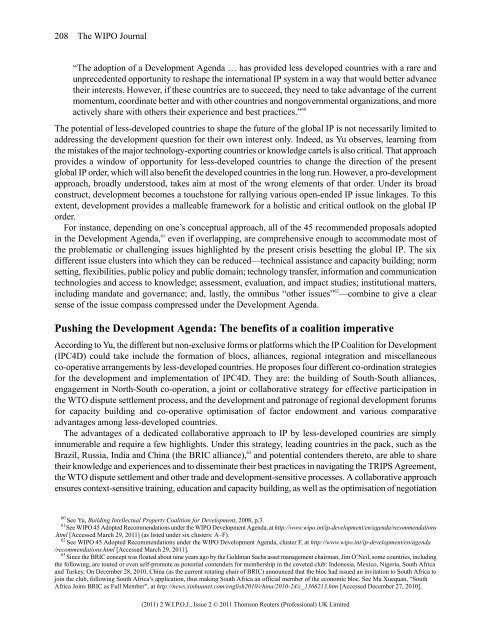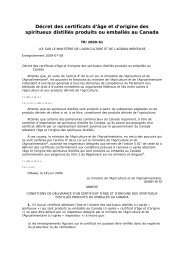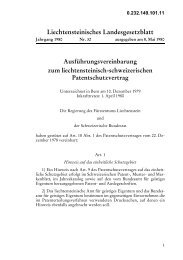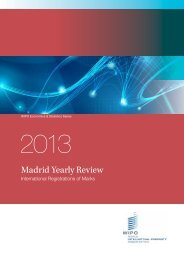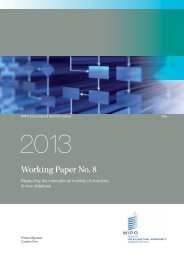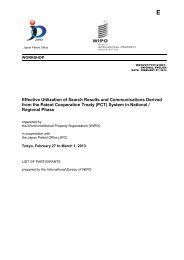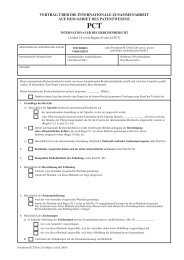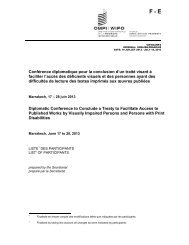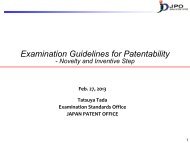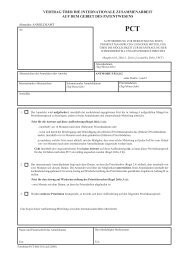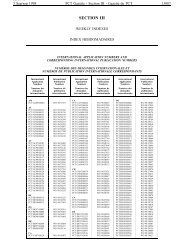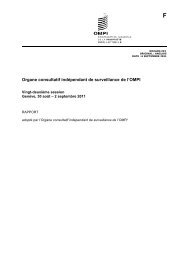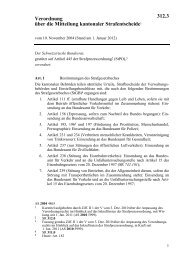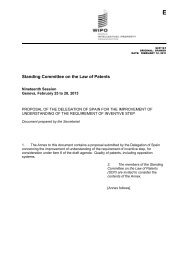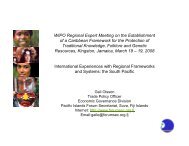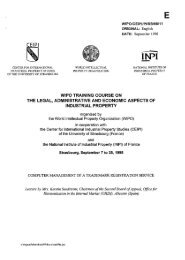WIPO Journal - World Intellectual Property Organization
WIPO Journal - World Intellectual Property Organization
WIPO Journal - World Intellectual Property Organization
You also want an ePaper? Increase the reach of your titles
YUMPU automatically turns print PDFs into web optimized ePapers that Google loves.
208 The <strong>WIPO</strong> <strong>Journal</strong><br />
“The adoption of a Development Agenda … has provided less developed countries with a rare and<br />
unprecedented opportunity to reshape the international IP system in a way that would better advance<br />
their interests. However, if these countries are to succeed, they need to take advantage of the current<br />
momentum, coordinate better and with other countries and nongovernmental organizations, and more<br />
actively share with others their experience and best practices.” 60<br />
The potential of less-developed countries to shape the future of the global IP is not necessarily limited to<br />
addressing the development question for their own interest only. Indeed, as Yu observes, learning from<br />
the mistakes of the major technology-exporting countries or knowledge cartels is also critical. That approach<br />
provides a window of opportunity for less-developed countries to change the direction of the present<br />
global IP order, which will also benefit the developed countries in the long run. However, a pro-development<br />
approach, broadly understood, takes aim at most of the wrong elements of that order. Under its broad<br />
construct, development becomes a touchstone for rallying various open-ended IP issue linkages. To this<br />
extent, development provides a malleable framework for a holistic and critical outlook on the global IP<br />
order.<br />
For instance, depending on one’s conceptual approach, all of the 45 recommended proposals adopted<br />
in the Development Agenda, 61 even if overlapping, are comprehensive enough to accommodate most of<br />
the problematic or challenging issues highlighted by the present crisis besetting the global IP. The six<br />
different issue clusters into which they can be reduced—technical assistance and capacity building; norm<br />
setting, flexibilities, public policy and public domain; technology transfer, information and communication<br />
technologies and access to knowledge; assessment, evaluation, and impact studies; institutional matters,<br />
including mandate and governance; and, lastly, the omnibus “other issues” 62 —combine to give a clear<br />
sense of the issue compass compressed under the Development Agenda.<br />
Pushing the Development Agenda: The benefits of a coalition imperative<br />
According to Yu, the different but non-exclusive forms or platforms which the IP Coalition for Development<br />
(IPC4D) could take include the formation of blocs, alliances, regional integration and miscellaneous<br />
co-operative arrangements by less-developed countries. He proposes four different co-ordination strategies<br />
for the development and implementation of IPC4D. They are: the building of South-South alliances,<br />
engagement in North-South co-operation, a joint or collaborative strategy for effective participation in<br />
the WTO dispute settlement process, and the development and patronage of regional development forums<br />
for capacity building and co-operative optimisation of factor endowment and various comparative<br />
advantages among less-developed countries.<br />
The advantages of a dedicated collaborative approach to IP by less-developed countries are simply<br />
innumerable and require a few highlights. Under this strategy, leading countries in the pack, such as the<br />
Brazil, Russia, India and China (the BRIC alliance), 63 and potential contenders thereto, are able to share<br />
their knowledge and experiences and to disseminate their best practices in navigating the TRIPS Agreement,<br />
the WTO dispute settlement and other trade and development-sensitive processes. A collaborative approach<br />
ensures context-sensitive training, education and capacity building, as well as the optimisation of negotiation<br />
60 See Yu, Building <strong>Intellectual</strong> <strong>Property</strong> Coalition for Development, 2008, p.3.<br />
61 See <strong>WIPO</strong> 45 Adopted Recommendations under the <strong>WIPO</strong> Development Agenda, at http://www.wipo.int/ip-development/en/agenda/recommendations<br />
.html [Accessed March 29, 2011] (as listed under six clusters: A–F).<br />
62 See <strong>WIPO</strong> 45 Adopted Recommendations under the <strong>WIPO</strong> Development Agenda, cluster F, at http://www.wipo.int/ip-development/en/agenda<br />
/recommendations.html [Accessed March 29, 2011].<br />
63 Since the BRIC concept was floated about nine years ago by the Goldman Sachs asset management chairman, Jim O’Neil, some countries, including<br />
the following, are touted or even self-promote as potential contenders for membership in the coveted club: Indonesia, Mexico, Nigeria, South Africa<br />
and Turkey. On December 28, 2010, China (as the current rotating chair of BRIC) announced that the bloc had issued an invitation to South Africa to<br />
join the club, following South Africa’s application, thus making South Africa an official member of the economic bloc. See Mu Xuequan, “South<br />
Africa Joins BRIC as Full Member”, at http://news.xinhuanet.com/english2010/china/2010-24/c_1366213.htm [Accessed December 27, 2010].<br />
(2011) 2 W.I.P.O.J., Issue 2 © 2011 Thomson Reuters (Professional) UK Limited


